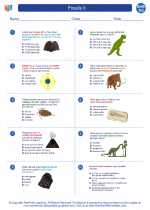Fossils II -> humans
Humans
Humans, or Homo sapiens, are the only extant members of the subtribe Hominina. They are characterized by their bipedal locomotion, highly developed brains, and complex social structures.
Physical Characteristics
Humans are distinguished by their erect posture and the ability to use tools, as well as their highly developed brains which enable complex problem-solving and communication.
Evolutionary History
The evolutionary history of humans can be traced back to the genus Homo, which emerged around 2.8 million years ago. The emergence of Homo sapiens, or modern humans, is estimated to have occurred around 300,000 years ago in Africa.
Interaction with the Environment
Humans have had a significant impact on the Earth's environment through activities such as agriculture, industrialization, and urbanization. These activities have led to environmental changes and challenges, including climate change and loss of biodiversity.
Study Guide
When studying the topic of humans, it's important to focus on the following key areas:
- Physical characteristics and adaptations
- Evolutionary history and the emergence of Homo sapiens
- Impact of humans on the environment
- Human societies and cultural developments
Be sure to review the anatomical and behavioral adaptations that have allowed humans to thrive in a variety of environments, as well as the role of human activities in shaping the Earth's systems.
.


